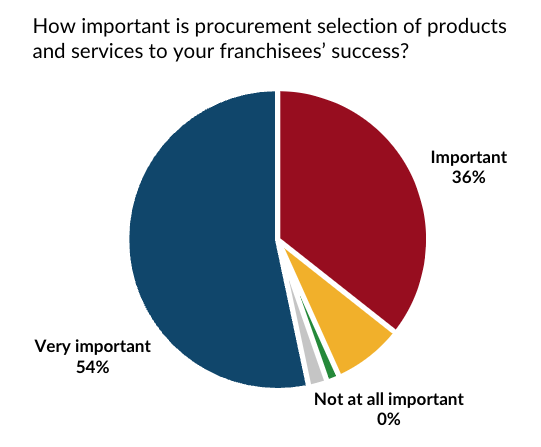
Discover how operating a closed marketplace can revolutionize franchise procurement with multi-sided cost savings, efficiencies, and flexibility
The best franchisors understand the impact an efficient procurement process can have. It can literally make or break a franchise’s success. Yet traditional procurement solutions often leave franchisees struggling with outdated processes, inefficiencies, and a lack of visibility, ultimately costing franchises valuable time and revenue. As the industry expands, the potential for using closed procurement marketplaces presents an opportunity to transform the buying experience and improve the entire supply chain’s efficiency.
During a recent webinar hosted by McFadyen Digital, featuring experts Jeffrey Mikos, Retail eCommerce & Marketplace Strategy Consultant at McFadyen Digital, and Larry Pethick, Director of Customer Experience at Restaurant Supply Chain Solutions (a Yum! Brands Co-op), the spotlight was on the role of closed procurement marketplaces in addressing common challenges faced by franchise operations. The content of this post is derived entirely from the insights shared during the webinar and the accompanying report on franchise procurement marketplaces. The conversation explored why closed marketplaces hold the key to a more efficient, cost-effective, and resilient procurement model for franchise networks.
The Challenges of Traditional Procurement in Franchising
Traditional procurement in franchising has often relied on centralized or decentralized models, each with its own set of limitations. Centralized procurement offers benefits like brand consistency and purchasing power, but lacks the flexibility required by local franchise operators. Decentralized procurement allows for local customization but lacks the control and efficiency that larger franchisors desire .
Franchisees often face challenges like managing procurement processes that are too complex, navigating cumbersome vendor relationships, and struggling to maintain inventory at optimal levels. These inefficiencies not only impact costs but also create friction that hinders the operational agility needed in a competitive market.
The Rise of Closed Procurement Marketplaces: A Strategic Solution

Out of the over 300 franchisor survey respondents, 90% indicated that product selection was Very Important or Important to the franchisee’s success. An aspect of franchise procurement experience in which the closed marketplace model excels.
Closed procurement marketplaces offer an innovative solution to these challenges by combining the benefits of both centralized and decentralized procurement models. These private digital platforms allow franchisees to purchase approved goods and services from a curated network of suppliers, benefiting from the purchasing power of a large group while maintaining the flexibility needed for local adaptation .
The benefits of leveraging a closed marketplace for procurement in franchise environments were made clear during the webinar. Closed marketplaces provide enhanced visibility into supply chain operations, simplify procurement processes, and offer an expanded range of products, all of which contribute to reducing costs and increasing operational efficiency. As McFadyen Digital’s survey revealed, 93% of franchise owners believe that a closed procurement marketplace would significantly improve their ecosystem .
Real-World Examples of Closed Marketplace Success
Several franchises are already reaping the rewards of transforming procurement through closed marketplaces. For instance, AccorHotels overhauled their digital procurement strategy to focus on localization, enabling hotels to source one-third of their supplies from local vendors. This not only streamlined procurement processes but also enhanced customer experience by incorporating locally-sourced amenities .
Another notable example is Orangetheory Fitness, which launched its “Supplies Central” closed marketplace in 2020. The platform simplified the procurement of approved supplies, allowing franchisees to focus more on their core mission—delivering an outstanding experience to their members. By onboarding suppliers quickly, Orangetheory ensured that franchisees could efficiently access co-branded products and reduce procurement hassles .
Driven Brands also leveraged a closed marketplace called “Driven Advantage,” connecting franchisees with over 80,000 products from third-party suppliers. This platform, which has already processed hundreds of thousands of orders, is projected to save franchisees over $50,000 annually, demonstrating the tangible cost benefits of using closed procurement marketplaces .
Key Benefits of Closed Procurement Marketplaces for Franchises
Closed procurement marketplaces are increasingly being recognized for their ability to drive efficiency, cost savings, and operational flexibility. During the webinar, Jeffrey Mikos and Larry Pethick highlighted several core benefits. Jeffrey Mikos, with over 15 years of experience in digital commerce, specializes in helping clients navigate the evolving landscape of procurement through innovative strategies, while Larry Pethick brings extensive expertise in marketing, e-commerce, and product management, driving customer experience transformation at Yum! Brands and beyond:
- Efficiency Gains: Nearly 29% of franchise operators indicated that improving operational efficiency is a primary benefit of closed marketplace procurement, emphasizing the need to simplify and streamline purchasing processes .
- Cost Savings: Closed procurement marketplaces enable bulk purchasing, supplier competition, and streamlined logistics, resulting in significant cost reductions. For instance, Driven Brands demonstrated that utilizing their closed marketplace could lead to substantial cost savings annually for each franchise location .
- Greater Product Choice: Closed marketplaces provide franchisees with access to a wider variety of approved products and suppliers, allowing for better customization and adaptation to local needs. This enhanced choice is a valuable feature, particularly for franchisees looking to differentiate their locations and adapt quickly to changes in customer preferences .
Overcoming Challenges to Unlock the Marketplace Potential
While the benefits are clear, some challenges still stand in the way of closed marketplace adoption. High initial costs and the perceived complexity of implementing marketplace solutions have been cited as barriers for many franchises. Concerns around system integration also make some operators hesitant to make the leap from traditional procurement systems to a closed marketplace model .
Addressing these challenges requires a strategic approach. McFadyen Digital’s experts emphasized the importance of starting small, focusing on early wins, and choosing closed marketplace platforms that offer robust integration capabilities. By demonstrating the value through pilot programs and gradually scaling up, franchisors can help franchisees embrace marketplace technology and maximize its potential.
Looking Ahead: The Future of Franchise Procurement
The franchise industry is currently in the early majority phase of adopting closed procurement marketplaces, with strong awareness and positive sentiment across the sector. As more franchises begin to implement marketplace models, we can expect a transformation in how franchise networks operate, enabling greater efficiency, cost-effectiveness, and responsiveness to market changes .
Closed procurement marketplaces present a powerful opportunity for franchises to move beyond the limitations of outdated systems and embrace a future where procurement is simpler, more efficient, and more adaptable. For franchisees, the value lies in having the right tools to manage day-to-day operations effectively, with access to a broader network of suppliers and streamlined processes.
Conclusion
The transition to closed procurement marketplaces represents a significant shift for franchise networks, one that can yield enormous benefits in terms of cost savings, efficiency, and supply chain resilience. The examples shared in McFadyen Digital’s recent webinar illustrate the transformative potential of these platforms when implemented strategically.
By adopting a closed marketplace model, franchises can empower their operators, enhance their buying power, and ultimately deliver a more frictionless and successful procurement experience. The time to leverage the power of closed procurement marketplaces is now—those who adapt will find themselves ahead of the competition, with a stronger, more resilient supply chain ready to meet the challenges of tomorrow.
For more information, visit the Franchise Procurement Marketplaces Report by McFadyen Digital or watch the on-demand webinar.
Related Articles
Turn Insight Into Impact.
Start Today.




